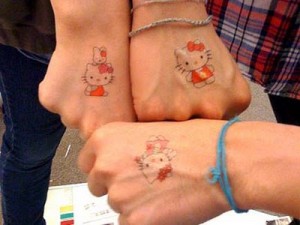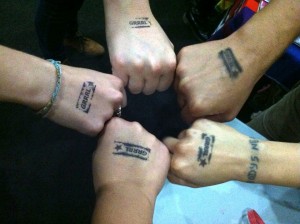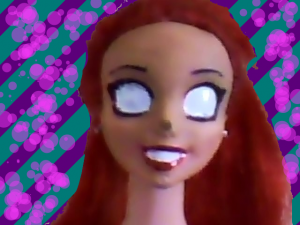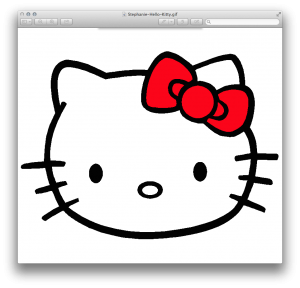Hello Kitty’s birthday has just passed, marking 40 years during which this prominent cultural icon has only ever lurked there on the periphery of my consciousness.
Though I do recall one occasion on some waterfront when I’d had enough to drink that I wondered, briefly, if I needed a tattoo. Out of nowhere — given I knew no more about Hello Kitty than this image appears everywhere around the world that you find tacky items manufactured from synthetic materials — it came to me that the tattoo for me would be a Hello Kitty on one shoulder, just by way of accenting my hairy-chested masculinity, at least while under the influence. Yeah and, like, daring anyone to challenge it.
 This morning, a couple of days too late to wish Hello Kitty a happy birthday, I find myself reflecting on this image’s remarkable appeal. I ask myself what it suggests to me (aside from wild inclinations to join the tattooed hoi polloi). “Vacuousness” leaps to mind. As does inanity, blankness and a young woman I knew many years ago who burned out on psychedelics. But surely none of these attributes could account for Hello Kitty’s vast fandom. (In fact they might — as you’ll see if you read on.)
This morning, a couple of days too late to wish Hello Kitty a happy birthday, I find myself reflecting on this image’s remarkable appeal. I ask myself what it suggests to me (aside from wild inclinations to join the tattooed hoi polloi). “Vacuousness” leaps to mind. As does inanity, blankness and a young woman I knew many years ago who burned out on psychedelics. But surely none of these attributes could account for Hello Kitty’s vast fandom. (In fact they might — as you’ll see if you read on.)
One fist of iron and the other of … Um.
Just as Hello Kitty has inhabited only the periphery of my own awareness all these years, I have inhabited only the periphery of the collective popular consciousness. I’m totally out of it. So I’ve decided to consult that collective popular consciousness, plunging in by way of Google.
Almost immediately I find an analysis that shows, at least from some POVs — notably, perhaps, copyright holder Sanrio’s perspective — the vacuousness is Hello Kitty’s essential advantage. Lucy Nicholas, in her thoughtful June 2003 M/C Journal piece “What fucked version of hello kitty are you?Or: Is Hello Kitty as a logo for third-wave riot grrrl feminism merely mainstream gender hegemony in disguise?” suggests the following:
A product without context, Hello Kitty is a blank signifier with the potential to be loaded with codes and meanings as diverse as the ideas of those who consume her/it. Yet Hello Kitty encompasses, and holds contradictory associations with, discourses as diverse as debates over reappropriation of symbols, consumerism and nationalism.
(I can’t find a working link to this: “What fucked version of hello kittie are you?” Quiz [Sarcasticwhore, 2003])
Then there’s Time magazine’s take (31 October 2014) for the 40th birthday, and Olivia B. Waxman’s “Hello Kitty at 40: Sexist Throwback or Empowering Icon?” Waxman focuses on Hello Kitty’s influences on women.
Interesting characterizations taken from that article include “adorable,” “overpowering,” “outsized influence … on the culture,” “the international representation of Japan’s culture of ‘kawaii,’ … items that are cute and meant to spread happiness and promote friendship.” Beyond that, the article casts a look towards the nitty-gritty:
Despite her seemingly benign and utterly adorable appearance, the character has become a polarizing cult figure around the world. Fans who collect everything Hello Kitty say she’s empowering, or at the very least a harmless hobby. Critics say she’s a sexist throwback to a time when girls, particularly Asian girls, were supposed to be cute and silent (the character has no mouth). Meanwhile, in some feminist circles, she’s also been embraced as a counterintuitive symbol of freedom to be feminine and strong. And to further muddy the picture, Sanrio [the company who created her and, reportedly, is subsequently making something like US$8 billion per year from this stroke of genius] recently clarified that the character is actually a third-grade girl and not a cat. A 40-year-old girl who looks just like a cat that is.
 For a clue as to why feminists might consider Hello Kitty an abomination, something that by comparison makes Barbie look like Gloria Steinem, watch April Lavigne singing “Hello Kitty,” surely a parody. In fact ironic uses of the image are often used to good effect.
For a clue as to why feminists might consider Hello Kitty an abomination, something that by comparison makes Barbie look like Gloria Steinem, watch April Lavigne singing “Hello Kitty,” surely a parody. In fact ironic uses of the image are often used to good effect.
Kathleen Hanna, for her part, finds Hello Kitty infantilizing: “I never liked Hello Kitty. I always joke that I’m going to be 80 years old with my Hello Kitty cane that I’m going to hit people with.”
Anyway, online Hello Kitty analysis abounds, and my earlier desire to become more pop-culturally au courant has been trumped by my appetite for breakfast. So I will conclude this post here.
I lied. If I weren’t so hungry, not to mention lazy, I’d develop the notion that Hello Kitty is part of a creeping fill-in-the-blanks culture of modularly commodified personalities (see “New you’s: Modular commodification“). This might even relate to Nicholas’ reference to Yu-Fen Ko, Hello Kitty and Identity Politics in Taiwan, 2000) when she suggests, “Hello Kitty is the ultimate symbol of pure irrational consumerism and commodity fetishism, a ‘trap of material slavery’.”
Who knows? Whatever. Now it’s definitely time for breakfast.


From Bill the Mathematician: http://en.puroland.jp
If Kitty is 40 years old, shouldn’t she be called Hello Catty? Or, better still, Hello Pussy?
I am impressed by the fact, pointed out in this sagacious and insightful blog, that Kitty (or Catty/Pussy) has no mouth. Every married man will agree that a female without a mouth is a boon greatly to be desired. I believe that accounts for Hello Feline’s popularity among men, assuming that such popularity exists.
Like the smiley face, I believe that Hello Kitty’s popularity is due solely to a surge of imbecility in the human genome. You will note that she is popular primarily among prepubescent, or just barely pubescent, Asian girls. I suspect that such eminent thinkers as Stephen Hawking would not find her appealing. But you’d have to ask him to find out.
Given your own skils as a cartoonist, you should have a go at creating the Hello Pussy icon. You could become rich and famous and assailed on all sides by militant feminists and arrested adolescent males wanting to buy you beer. (Tha same stretches of homo sap DNA that cue prepubescent girls to find Hello Kitty ‘adorable’ would probably prime similar responses in arrested adolescent males when confronted with Hello Pussy.)
Just a theory. I have little background in molecular biology.